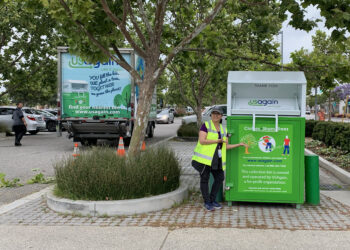A Connecticut bill sits in uncharted territory when it comes to regulating plastic bags: The legislation ensures they’re recyclable and include recycled content, but it does not ban them.
As a result, the bag industry, which has fought tooth and nail to halt bag bans in other states, has signaled its willingness to consider the approach offered by Senate Bill 226, the Hartford Courant reports.
Meanwhile, a separate bill in the Constitution State, Senate Bill 233, requires the state Department of Energy and Environmental Protection (DEEP) to explore the possibility of implementing extended producer responsibility for packaging.
Both bills are from Democratic state Sen. Ted Kennedy Jr., who last year initially proposed, a bag ban. The effort ultimately failed to gain support.
The General Assembly’s Joint Committee on the Environment is scheduled to hold hearings on both bills on March 4.
Bag bill
SB 226 requires that starting July 1, 2018 half of the single-use bags provided by stores must be fully recyclable and include at least 80 percent post-consumer recycled content. Additionally, they must have a handle and “be designed and manufactured for multiple reuses.” Starting July 1, 2020 all of the bags offered by stores must meet those criteria.
The bill also mandates that by 2017 DEEP ink a deal with representatives of the grocery and retail sectors. The step would establish those industries’ commitments to reducing the distribution of paper and single-use bags by half by 2021. The agreement would also put them on the hook to establish single-use bag recycling programs at all participating stores, among other requirements.
Exploring EPR
SB 233, meanwhile, requires DEEP to amend the statewide solid waste plan by July 1, 2017 to include a strategy for diverting at least half of consumer packaging by 2024.
The bill directs the head of DEEP to consult with the consumer packaging industry to identify opportunities for source reduction as well as increased recyclability and recycled content for consumer packaging. The DEEP commissioner must also consult the packaging industry and “assess the viability of establishing an industry-financed stewardship program for the collection, management and recycling of consumer packaging,” similar to what the state already does for paint and mattresses.
By Feb. 1, 2018, the commissioner would submit the amendment to the legislature.
No U.S. state has established extended producer responsibility (EPR) programs for printed paper and packaging, although the approach has been discussed in neighboring Rhode Island and in California.



























